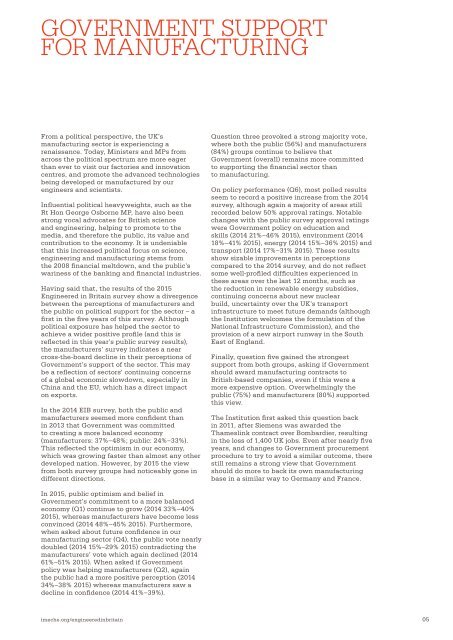ENGINEERED IN BRITAIN MANUFACTURING A SUCCESSFUL ECONOMY?
1Z9yTU8
1Z9yTU8
Create successful ePaper yourself
Turn your PDF publications into a flip-book with our unique Google optimized e-Paper software.
GOVERNMENT SUPPORT<br />
FOR MANUFACTUR<strong>IN</strong>G<br />
From a political perspective, the UK’s<br />
manufacturing sector is experiencing a<br />
renaissance. Today, Ministers and MPs from<br />
across the political spectrum are more eager<br />
than ever to visit our factories and innovation<br />
centres, and promote the advanced technologies<br />
being developed or manufactured by our<br />
engineers and scientists.<br />
Influential political heavyweights, such as the<br />
Rt Hon George Osborne MP, have also been<br />
strong vocal advocates for British science<br />
and engineering, helping to promote to the<br />
media, and therefore the public, its value and<br />
contribution to the economy. It is undeniable<br />
that this increased political focus on science,<br />
engineering and manufacturing stems from<br />
the 2008 financial meltdown, and the public’s<br />
wariness of the banking and financial industries.<br />
Having said that, the results of the 2015<br />
Engineered in Britain survey show a divergence<br />
between the perceptions of manufacturers and<br />
the public on political support for the sector – a<br />
first in the five years of this survey. Although<br />
political exposure has helped the sector to<br />
achieve a wider positive profile (and this is<br />
reflected in this year’s public survey results),<br />
the manufacturers’ survey indicates a near<br />
cross-the-board decline in their perceptions of<br />
Government’s support of the sector. This may<br />
be a reflection of sectors’ continuing concerns<br />
of a global economic slowdown, especially in<br />
China and the EU, which has a direct impact<br />
on exports.<br />
In the 2014 EIB survey, both the public and<br />
manufacturers seemed more confident than<br />
in 2013 that Government was committed<br />
to creating a more balanced economy<br />
(manufacturers: 37%–48%; public: 24%–33%).<br />
This reflected the optimism in our economy,<br />
which was growing faster than almost any other<br />
developed nation. However, by 2015 the view<br />
from both survey groups had noticeably gone in<br />
different directions.<br />
Question three provoked a strong majority vote,<br />
where both the public (56%) and manufacturers<br />
(84%) groups continue to believe that<br />
Government (overall) remains more committed<br />
to supporting the financial sector than<br />
to manufacturing.<br />
On policy performance (Q6), most polled results<br />
seem to record a positive increase from the 2014<br />
survey, although again a majority of areas still<br />
recorded below 50% approval ratings. Notable<br />
changes with the public survey approval ratings<br />
were Government policy on education and<br />
skills (2014 21%–46% 2015), environment (2014<br />
18%–41% 2015), energy (2014 15%–36% 2015) and<br />
transport (2014 17%–31% 2015). These results<br />
show sizable improvements in perceptions<br />
compared to the 2014 survey, and do not reflect<br />
some well-profiled difficulties experienced in<br />
these areas over the last 12 months, such as<br />
the reduction in renewable energy subsidies,<br />
continuing concerns about new nuclear<br />
build, uncertainty over the UK’s transport<br />
infrastructure to meet future demands (although<br />
the Institution welcomes the formulation of the<br />
National Infrastructure Commission), and the<br />
provision of a new airport runway in the South<br />
East of England.<br />
Finally, question five gained the strongest<br />
support from both groups, asking if Government<br />
should award manufacturing contracts to<br />
British-based companies, even if this were a<br />
more expensive option. Overwhelmingly the<br />
public (75%) and manufacturers (80%) supported<br />
this view.<br />
The Institution first asked this question back<br />
in 2011, after Siemens was awarded the<br />
Thameslink contract over Bombardier, resulting<br />
in the loss of 1,400 UK jobs. Even after nearly five<br />
years, and changes to Government procurement<br />
procedure to try to avoid a similar outcome, there<br />
still remains a strong view that Government<br />
should do more to back its own manufacturing<br />
base in a similar way to Germany and France.<br />
In 2015, public optimism and belief in<br />
Government’s commitment to a more balanced<br />
economy (Q1) continue to grow (2014 33%–40%<br />
2015), whereas manufacturers have become less<br />
convinced (2014 48%–45% 2015). Furthermore,<br />
when asked about future confidence in our<br />
manufacturing sector (Q4), the public vote nearly<br />
doubled (2014 15%–29% 2015) contradicting the<br />
manufacturers’ vote which again declined (2014<br />
61%–51% 2015). When asked if Government<br />
policy was helping manufacturers (Q2), again<br />
the public had a more positive perception (2014<br />
34%–38% 2015) whereas manufacturers saw a<br />
decline in confidence (2014 41%–39%).<br />
imeche.org/engineeredinbritain<br />
05


